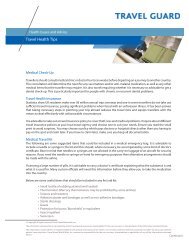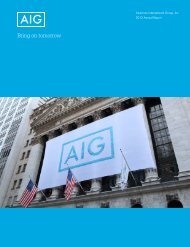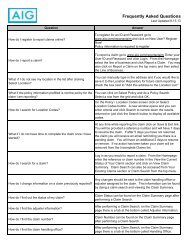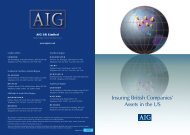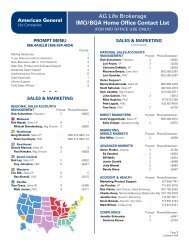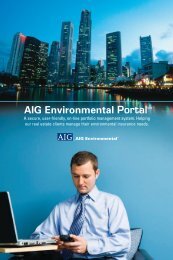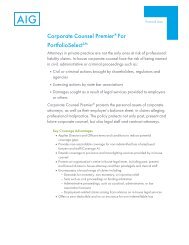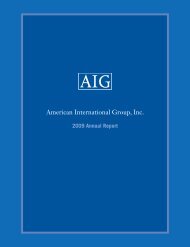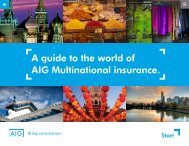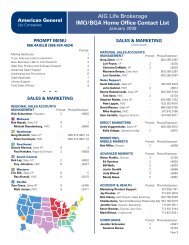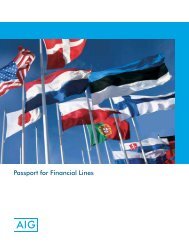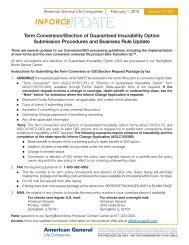2007 Annual Report - AIG.com
2007 Annual Report - AIG.com
2007 Annual Report - AIG.com
You also want an ePaper? Increase the reach of your titles
YUMPU automatically turns print PDFs into web optimized ePapers that Google loves.
American International Group, Inc. and Subsidiaries<br />
Management’s Discussion and Analysis of<br />
Financial Condition and Results of Operations Continued<br />
Life Insurance & Retirement Services Invested<br />
Assets<br />
With respect to Life Insurance & Retirement Services, <strong>AIG</strong> uses<br />
asset-liability management as a tool worldwide in the life insur-<br />
ance business to influence the <strong>com</strong>position of the invested assets<br />
and appropriate marketing strategies. <strong>AIG</strong>’s objective is to<br />
maintain a matched asset-liability structure. However, in certain<br />
markets, the absence of long-dated fixed in<strong>com</strong>e investment<br />
instruments may preclude a matched asset-liability position. In<br />
addition, <strong>AIG</strong> may occasionally determine that it is economically<br />
advantageous to be temporarily in an unmatched position. To the<br />
extent that <strong>AIG</strong> has maintained a matched asset-liability structure,<br />
the economic effect of interest rate fluctuations is partially<br />
mitigated.<br />
<strong>AIG</strong>’s investment strategy for the Life Insurance & Retirement<br />
Services segment is to produce cash flows greater than maturing<br />
insurance liabilities. <strong>AIG</strong> actively manages the asset-liability rela-<br />
tionship in its foreign operations, even though certain territories<br />
lack qualified long-term investments or certain local regulatory<br />
authorities may impose investment restrictions. For example, in<br />
several Southeast Asian countries, the duration of investments is<br />
shorter than the effective maturity of the related policy liabilities.<br />
Therefore, there is risk that the reinvestment of the proceeds at<br />
the maturity of the initial investments may be at a yield below that<br />
of the interest required for the accretion of the policy liabilities.<br />
Additionally, there exists a future investment risk associated with<br />
certain policies currently in-force which will have premium receipts<br />
in the future. That is, the investment of these future premium<br />
receipts may be at a yield below that required to meet future<br />
policy liabilities.<br />
<strong>AIG</strong> actively manages the interest rate assumptions and<br />
crediting rates used for its new and in force business. Business<br />
strategies continue to evolve to maintain profitability of the overall<br />
business. In some countries, new products are being introduced<br />
with minimal investment guarantees, resulting in a shift toward<br />
investment-linked savings products and away from traditional<br />
savings products with higher guarantees.<br />
The investment of insurance cash flows and reinvestment of<br />
the proceeds of matured securities and coupons requires active<br />
management of investment yields while maintaining satisfactory<br />
investment quality and liquidity.<br />
<strong>AIG</strong> may use alternative investments, including equities, real<br />
estate and foreign currency denominated fixed in<strong>com</strong>e instruments<br />
in certain foreign jurisdictions where interest rates remain<br />
low and there are limited long-dated bond markets to extend the<br />
duration or increase the yield of the investment portfolio to more<br />
closely match the requirements of the policyholder liabilities and<br />
DAC recoverability. This strategy has been effectively used in<br />
Japan and more recently by Nan Shan in Taiwan. In Japan, foreign<br />
assets, excluding those matched to foreign liabilities, were<br />
approximately 31 percent of statutory assets, which is below the<br />
maximum allowable percentage under current local regulation.<br />
Foreign assets <strong>com</strong>prised approximately 33 percent of Nan<br />
Shan’s invested assets at December 31, <strong>2007</strong>, slightly below the<br />
maximum allowable percentage under current local regulation. The<br />
majority of Nan Shan’s in-force policy portfolio is traditional life<br />
and endowment insurance products with implicit interest rate<br />
guarantees. New business with lower interest rate guarantees are<br />
gradually reducing the overall interest requirements, but asset<br />
portfolio yields have declined faster due to the prolonged low<br />
interest rate environment. As a result, although the investment<br />
margins for a large block of in-force policies are negative, the<br />
block remains profitable overall because the mortality and<br />
expense margins presently exceed the negative investment<br />
spread. In response to the low interest rate environment and the<br />
volatile exchange rate of the Taiwanese dollar, Nan Shan is<br />
emphasizing new products with lower implied guarantees, includ-<br />
ing participating endowments and investment-linked products.<br />
Although the risks of a continued low interest rate environment<br />
coupled with a volatile Taiwanese dollar could increase net<br />
liabilities and require additional capital to maintain adequate local<br />
solvency margins, Nan Shan currently believes it has adequate<br />
resources to meet all future policy obligations.<br />
<strong>AIG</strong> actively manages the asset-liability relationship in its<br />
domestic operations. This relationship is more easily managed<br />
through the availability of qualified long-term investments.<br />
A number of guaranteed benefits, such as living benefits or<br />
guaranteed minimum death benefits, are offered on certain<br />
variable life and variable annuity products. <strong>AIG</strong> manages its<br />
exposure resulting from these long-term guarantees through<br />
reinsurance or capital market hedging instruments.<br />
<strong>AIG</strong> invests in equities for various reasons, including diversify-<br />
ing its overall exposure to interest rate risk. Available for sale<br />
bonds and equity securities are subject to declines in fair value.<br />
Such declines in fair value are presented in unrealized apprecia-<br />
tion or depreciation of investments, net of taxes, as a <strong>com</strong>ponent<br />
of Accumulated other <strong>com</strong>prehensive in<strong>com</strong>e. Declines that are<br />
determined to be other-than-temporary are reflected in in<strong>com</strong>e in<br />
the period in which the intent to hold the securities to recovery no<br />
longer exists. See Valuation of Invested Assets herein. Generally,<br />
insurance regulations restrict the types of assets in which an<br />
insurance <strong>com</strong>pany may invest. When permitted by regulatory<br />
authorities and when deemed necessary to protect insurance<br />
assets, including invested assets, from adverse movements in<br />
foreign currency exchange rates, interest rates and equity prices,<br />
<strong>AIG</strong> and its insurance subsidiaries may enter into derivative<br />
transactions as end users to hedge their exposures. For a further<br />
discussion of <strong>AIG</strong>’s use of derivatives, see Risk Management —<br />
Credit Risk Management — Derivatives herein.<br />
In certain jurisdictions, significant regulatory and/or foreign<br />
governmental barriers exist which may not permit the immediate<br />
free flow of funds between insurance subsidiaries or from the<br />
insurance subsidiaries to <strong>AIG</strong> parent. For a discussion of these<br />
restrictions, see Item 1. Business — Regulation.<br />
Life Insurance & Retirement Services invested assets grew by<br />
$41.7 billion, or 10 percent, during <strong>2007</strong> as bond holdings grew<br />
by $5.3 billion, and listed equity holdings grew by $9.3 billion, or<br />
39 percent.<br />
106 <strong>AIG</strong> <strong>2007</strong> Form 10-K



